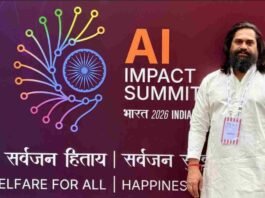Kolkata, June 5, 2025: In a heartfelt tribute to the spirit of womanhood, Woman Times, in association with Mamta Sumit Binani Foundation, CK Birla Hospitals CMRI, and Sister Nivedita University, organized a soul-stirring celebration titled “Astitwa: Ek Roop Kai Pehchaan” at The HHI, Kolkata. The event served as a powerful ode to the multifaceted roles of women and the indomitable strength they embody in every phase of life.
The celebration was not just another gathering—it was a movement in itself, emphasizing the importance of recognizing and respecting women in all their avatars: as mothers, daughters, professionals, creators, caregivers, and visionaries. By synchronizing the themes of both Mother’s Day and Women’s Day, “Astitwa” created a bridge that celebrated the eternal relevance of womanhood across generations and contexts.
A Star-Studded Celebration of Impact and Identity
Gracing the occasion were celebrated personalities who have made an indelible mark in their respective fields. Among them, iconic actors Rituparna Sengupta and Priyanka Sarkar stood out—not only for their dazzling screen presence but also for their off-screen contributions to social causes. They were each felicitated with the Astitwa Honour, recognizing their exceptional journeys, enduring influence, and continued efforts to uplift and inspire society, especially women.
Joining them were distinguished names such as Santi Das Basak, Dr. Parnamita Bhattacharya, Zeba Akhtar Ali, and Naina More, along with a gathering of socially conscious individuals, change-makers, and spirited citizens committed to driving forward the narrative of women’s empowerment.
Enlightening Sessions: Knowledge for a Better Tomorrow
A key feature of “Astitwa: Ek Roop Kai Pehchaan” was its focus on health awareness and education—a central pillar of this year’s initiative. The event hosted three impactful sessions aimed at empowering women through knowledge about critical health-related issues:
-
Gynecology Session: Experts shed light on key women’s health issues, myths around menstruation, menopause, and reproductive health—encouraging open dialogue and awareness.
-
Nutrition Session: Nutritionists provided vital insights into balanced diets, lifestyle choices, and diet-related disease prevention. This was especially relevant for urban women who often neglect their own health amidst familial and professional responsibilities.
-
Dementia Awareness Session: This segment emphasized the urgent need for society to understand and prepare for the growing challenge of dementia in India’s aging population. With families often unaware of how to care for dementia patients, the discussion proved both timely and transformative.
These sessions were not only informative but also deeply engaging, sparking conversations among attendees long after the presentations concluded. The knowledge imparted was practical, accessible, and designed to create ripples of awareness at both personal and community levels.
Voices of Purpose and Power
In her powerful address, Mrs. Moonmoon Chakraborty, CEO of Woman Times, expressed heartfelt gratitude for the event’s overwhelming reception. “Astitwa: Ek Roop Kai Pehchaan has never been just our initiative. It belongs to everyone who believes in the power and potential of women. This gathering reflects real stories, shared hopes, and collective dreams. As a platform that champions health, empowerment, and dignity, we are proud to align with causes that can lead to real change on the ground,” she said.
Mrs. Chakraborty emphasized that health is at the very core of Woman Times’ mission in 2025. Through collaborations with healthcare institutions and wellness experts, the organization aims to deepen its impact on community well-being, particularly for women across all socio-economic backgrounds.
Mrs. Mamta Binani, a leading corporate professional and Advisory Board Member of Woman Times, echoed similar sentiments. “Astitwa is more than an event—it’s a recognition of every woman’s unique identity and journey. It is a reminder that acknowledging women’s achievements and challenges in health, leadership, and art is the only way to build a more equitable and compassionate world,” she said.
In a touching speech, Ms. Poulami Chakraborty, Founding Editor of Woman Times, reflected on the divine strength and grace of women. “If human beings are the most powerful species, then women are perhaps something even beyond that. A woman deserves respect not just because of her roles—as daughter, wife, or mother—but because of who she is. Respect must never be conditional. It must be foundational.”
Honoring Cinema as a Vehicle of Awareness
A standout moment during the event was the recognition of Team Puratawn, creators of a poignant short film that focuses on dementia awareness. As dementia continues to rise among the elderly in India, the team’s creative efforts were celebrated for shedding light on this silent health crisis. By weaving powerful storytelling with social relevance, Puratawn’s film managed to evoke empathy and spark dialogue.
The award served as a reminder that cinema, when used meaningfully, can become a medium for powerful advocacy and change. The team’s initiative stood as a testimony to the growing need for innovative outreach methods in public health awareness.
Philanthropy That Empowers
Further underlining the event’s mission of inclusive empowerment, the organizers announced cash sponsorships for three underprivileged women, each facing extreme hardship. These women, though currently struggling, represent the resilience that Astitwa seeks to celebrate. The financial support is intended to give them a renewed opportunity to rebuild their lives with dignity.
This philanthropic gesture was supported by Mamta Binani, Naina More, and Sirshendu Niyogi, showcasing how community leaders can drive real impact through focused action and collaboration.
A Collective Step Forward
“Astitwa: Ek Roop Kai Pehchaan” successfully brought together policy makers, artists, healthcare experts, corporate professionals, and everyday citizens on a common platform—one where dialogue met action, and celebration met reflection.
Whether it was through honoring trailblazers in the arts, addressing urgent healthcare needs, or supporting women in distress, the event stood tall as an example of what’s possible when intent is backed by action.
In a society where women are often expected to silently bear the weight of responsibilities, Astitwa amplified their voices. It reminded everyone present that womanhood is not a monolith but a magnificent tapestry of strength, emotion, intuition, intellect, and grace.
Conclusion
As the curtains fell on this year’s edition of Astitwa, the air was filled with hope, resolve, and a shared understanding that empowering women means empowering humanity.
Events like these are more than symbolic—they are catalysts of transformation, both individual and collective. And as long as such platforms continue to flourish, the journey toward a more inclusive, informed, and empathetic society will stay on course.




